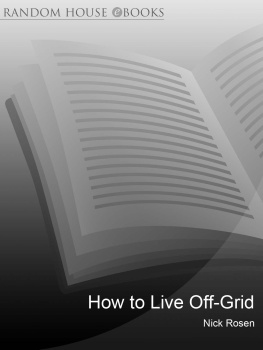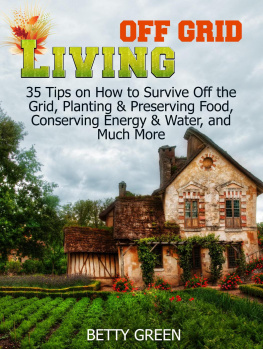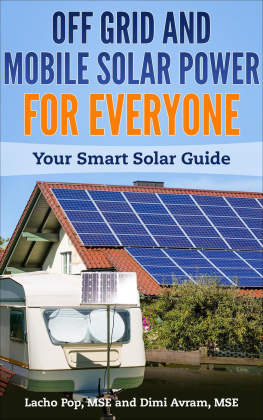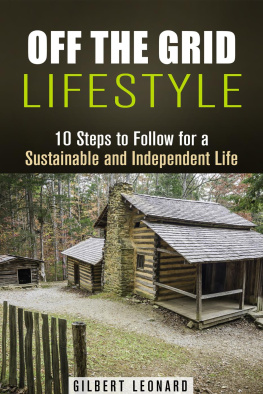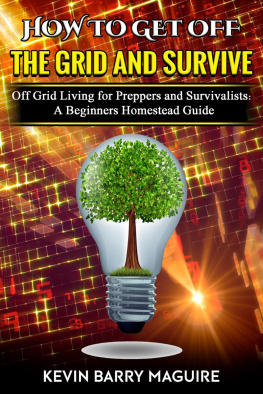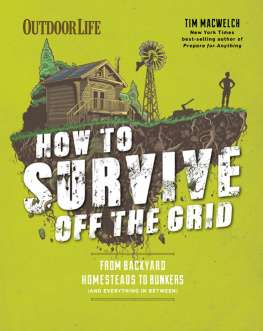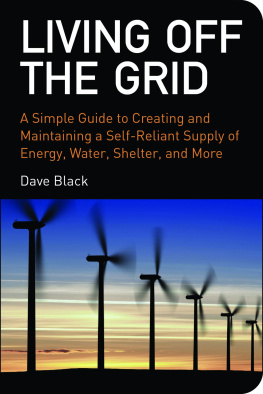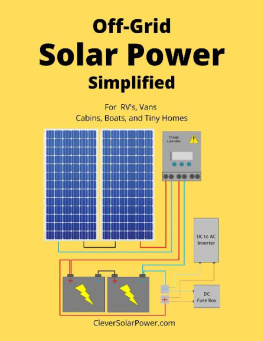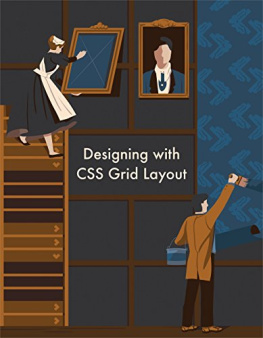About the Author
Nick Rosen is a documentary-maker, journalist and broadcaster. He devoted the early years of his career to a study of the power of global corporations. In 1995 he founded one of the UKs first Internet companies, and discovered the joys of life off-grid when he bought a shack in Majorca. After a decade of living in city squats and unlicensed warehouses in London, he now has a proper house in the city but gets away whenever he can. In 2005, he launched a website on the subject of this book: www.off-grid.net.
About the Book
Off-grid: a place, building or person without mains or power.
Static or mobile in a house or a hut, a boat or a camper van its all about loosening the ties that bind us to the familiar world of commuting, mortgages, no time, fast food, in order to find our own space and rediscover the joys of the natural world.
Complete with camper van, Nick sets off around the UK to find off-grid heaven and meet people who are living the dream. Along the way he runs into backpackers and businessmen, radical hermits and right-wing survivalists and plenty of working-parent families too. Some off-gridders want to save the world, some live that way because it is all they can afford, and some just want to be free.
Sincere but irreverent, this is Nicks guide to avoiding pitfalls, to finding solutions (and to some brilliant gadgets) as he strives to perfect the skills of this practical, freewheeling kind of self-sufficiency.
Acknowledgements
In the course of my researching this book, many people invited me into their off-grid homes, be they boats, vans, yurts, benders, cabins or even brick buildings. Thanks for giving so generously of your personal space and your time, both when I visited and in subsequent phone calls, especially Dylan Evans, who is writing his own book, and who shared his thoughts on the potential chaos facing our society as we sat in his yurt.
I am also grateful to Stephen Cottle and Simon Fairlie for their help and suggestions on planning permission. It is a complex subject, and any mistakes that remain are mine, not theirs. Thanks also to Simon Chambers for his filming assistance and wise words about permaculture; Piet at Raisystems for answering so many questions about renewable energy systems; Giles Elgood, who told me the word; and Paul Allen (of CAT), who was one of the first in this country to spot the importance of living off-grid. Particular thanks to Michael Edge, whose encouragement kept me going; Keith at Pendragon Framers, who made sure the van came to no harm; Alex Aylesbury of Agency 23 for his work on the website; Ivan Mulcahy, who advised on an early draft; Felix Unger-Hamilton, who maintained and monitored the video-tapes as I travelled around the country; and Bridget Smith for the nice photo of me.
I lucked into editor Susanna Wadeson, a model of enthusiasm and level-headed advice, and brilliant copy editor Daniel Balado. Jonathan Winkler was invaluable on the historical research, and Elena Andreicheva scoured the Internet for useful tips and fact-checked on scores of topics.
Afterword
When I started writing this book, the idea of living off-grid was not on the cultural radar. Nothing earth-shattering has changed since, just a steady drip-drip of climate change events: melting ice-caps, weird weather, Al Gore, and the growing clamour of celebrities, broadcasters and mega-corporations jumping on the green bandwagon. But the media has slowly warmed to the idea of off-grid living. Since the first edition was published in June 2007, the Grand Designs TV series started using the word off-grid; Jyoti Fernandes did a deal with the River Cottage TV series; BBC Breakfast Time featured Nigel Lowthrop in his social enterprise wood in Lincolnshire; the Sunday Times put Off-Grid in their weekly Going Up trend monitor, with the words Free yourself from bills and the chains of corporate enslavement; and even the Sunday Express property section devoted a feature to the money you could save from buying an off-grid home.
The medias more general infatuation with all things eco can only be a move in the right direction, but inevitably most of the coverage is designed to make us feel that if only we used a few more low-energy light-bulbs, turned the thermostat down a notch, saved water and recycled, we could go on living pretty much as before. We cant, but it will take something pretty nasty in the way of a natural catastrophe to make this sink in.
The summer of 2007 was no scorcher, in fact it was rather wet; we even had the irony of a flood causing a water shortage in parts of the country. There was no panic-inducing moment that persuaded large numbers they had better take the off-grid lifestyle seriously, but the indicators kept ticking towards a time when living off-grid will seem a sensible, mainstream choice. The price of oil crept towards $100 a barrel; sales of wood-burning stoves reached their highest point since the introduction of gas central heating; and house prices cooled, though they remained unaffordable to vast swathes of first-time buyers.
In July 2007 Tony Wrench was yet again refused planning permission by Pembrokeshire Council for his roundhouse; yet to their own and everyone elses surprise the residents of Land Matters in Devon received temporary planning permission in August. The public inquiry pitted Simon Fairlie against the financial resources of the local residents and their lawyers. The planning inspector indicated that one of the reasons for finding in favour of the bender community was that living off-grid coincided with so much current Government policy: lowering carbon emissions, bringing life and employment back to the countryside, and above all creating affordable housing. There was also good news from Marcus Tribe, who told me that the rates on his woodland workshop had been reduced from a thousand pounds a year to a couple of hundred.
I kept looking for my own off-grid place, and now I think I have found it a piece of woodland which does not conform to every one of my criteria, but is beautiful and tranquil. And I am extremely fortunate that I did not have to buy it: I have it on a long-term loan from someone who read this book and contacted me via the off-grid website, which has become a place where people can meet others who are thinking of making the move off-grid, and find like-minded souls in their area.
In September 2007 Baroness Miller of Chilthorne Domer, a Lib Dem peer, raised a series of parliamentary questions, and they led to some useful answers which will be of help in terms of future planning appeals to people who want to live off-grid. Baroness Miller asked whether the Government would be introducing a planning category for low-impact, low-density housing that is not connected to national distribution networks for water and electricity. Baroness Andrews, Parliamentary Under-Secretary of State, Department for Communities and Local Government, replied, Local planning authorities should encourage applicants to bring forward sustainable and environmentally friendly new development, and consider locations for housing where it can readily and viably draw its energy supply from decentralised energy supply systems based on renewable and low-carbon forms of energy supply, or where there is clear potential for this to be realised. It remains for this answer to be tested in a public enquiry, but the suggestion is that the government is moving towards a presumption in favour of off-grid homes. Another written answer to Baroness Miller, this time from Lord Rooker, announced that there were around 50,000 private water supplies, serving 0.6 per cent of the population. That means a total of roughly 360,000 people are off the water grid in the UK. But, as is so often the case, the Government sent out mixed signals. Lord Rooker went on to make it clear that the department in charge of climate change and environment is not currently concerned with promoting the energy-saving lifestyle of off-grid living. Defra does not hold statistics for the number of houses off the electricity grid and has made no estimate of the average energy efficiency or carbon dioxide emissions from homes unconnected to mains electricity supply. The Government do not provide incentives for householders to manage their own energy needs.

